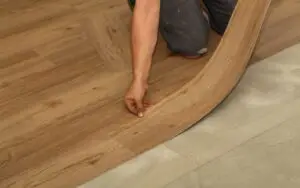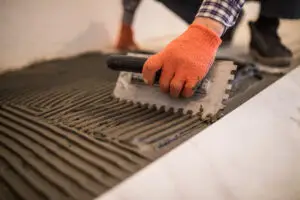Understanding Stone Flooring
What to Consider When Choosing Stone
Durability
Durability is one of the most important factors to consider when choosing stone flooring, especially in high-traffic areas such as entryways, kitchens, and hallways. Some stones, like granite, are exceptionally hard and resistant to scratches and stains, while others, like limestone, are softer and may require more care. Professional installers are well-versed in all of the characteristics of different types of stone, and they can help you make the right choice for your specific needs.
Style
Style is another important consideration, as the stone you choose should complement your home’s aesthetic and design. Stone flooring comes in a wide variety of colors, patterns, and textures, ranging from classic to modern to rustic. It is always important to have an overall design in mind, before you make a decision on your stone floors, to make sure everything blends together properly.
Maintenance
Maintenance requirements vary significantly between different types of stone flooring. Some stones, like granite and slate, are relatively low-maintenance and easy to clean, while others, like marble and travertine, require more frequent sealing, and specialized cleaning products. You should always consider your lifestyle, and your willingness to perform maintenance, when making your stone flooring selection.
Cost
The cost of stone flooring will vary, based on the type of stone, its rarity, and the complexity of the installation. Some stones, such as marble and granite, are more expensive, due to their unique beauty and durability. Professional flooring installers are always able to provide you with an accurate quote and will also help you find ways to save money, while also ensuring a high-quality result.
Types of Stone Flooring
Granite
Granite is one of the most durable and popular choices for stone flooring. It is known for its strength, resistance to stains and scratches, and is also available in a wide variety of colors and patterns. This makes it one of the most versatile, and desirable stone flooring options for both homeowners and businesses alike.
Marble
Marble is a luxurious and elegant flooring choice that is known for its beauty and unique veining. It is a softer stone than granite, and is also more prone to scratching and staining, however, its appearance makes it a very popular choice, despite these minor drawbacks. It is best to discuss these issues with a professional installer, so you are prepared for any maintenance that may be required.
Limestone
Limestone is a natural stone that offers a warm and inviting feel, and it is also a more affordable option compared to marble and granite. It is a softer stone, and is also more porous, which means it will require regular sealing to protect it from stains, and moisture. Professional installers can always recommend which type of cleaners and sealers are best for your limestone floors.
Travertine
Travertine is a type of limestone that is characterized by its textured surface, and unique patterns. It offers a rustic and elegant appearance, and is also very durable, if properly maintained. It is also fairly resistant to heat and moisture, which makes it an excellent choice for bathrooms, and kitchens.
Slate
Slate is a fine-grained, metamorphic rock that is known for its durability, and its slip-resistant surface. It is available in a range of colors, including gray, black, green, and purple, and is a great choice for homeowners who want a stone floor that is both beautiful and rugged. Slate is also relatively easy to maintain, and will last for many years, when properly installed by a professional.
Ranking the Best Stone Flooring Options
Durability
Most Durable
Granite is the most durable stone flooring option, and is an excellent choice for high traffic areas that require a very tough, and long lasting material. With proper installation, and maintenance, granite can easily last for many decades, and it will continue to look great with proper care.
Moderately Durable
Slate is a moderately durable option that is very resistant to scratches, and stains. It is an excellent choice for homeowners who want a beautiful, and long lasting floor, that is slightly less expensive than granite. Slate can be used in many different applications, and it offers an elegant look that will add a great deal of value to any home or business.
Least Durable
Marble, limestone, and travertine, are less durable than granite and slate, and can be more prone to scratches and stains, however, their unique beauty, often makes them a desirable choice, despite their potential drawbacks. Proper maintenance is crucial for these softer stones, and professional installers are often very helpful at providing you with the best methods and products for keeping your stone floors looking their best.
Style and Appearance
Classic
Marble is the epitome of classic elegance, and it has long been prized for its smooth surface, unique veining, and luxurious appearance. It is an excellent choice for homeowners who want an elegant look that will never go out of style, and will continue to look great for many years to come.
Modern
Slate is a great choice for modern designs due to its sleek, minimalist, and contemporary look. It is an excellent way to add a touch of natural beauty, without sacrificing style, or convenience. It is also very easy to clean, and is an excellent choice for a wide variety of applications.
Rustic
Travertine is a great choice for rustic designs due to its textured surface, earthy tones, and natural beauty. It offers a unique and timeless look that is both versatile, and durable, and it will always add a touch of natural beauty to any design.
Maintenance
Easy to Maintain
Granite and slate are both relatively easy to maintain, and will only require regular cleaning with mild soap and water. It is important to avoid using harsh chemicals, or abrasive cleaners, as these can damage the surface of the stone, and leave a dull, and scratched appearance. A professional installer can always recommend the best cleaning products for your specific type of flooring.
Moderate Maintenance
Travertine requires moderate maintenance, which includes regular cleaning, and periodic sealing, to protect it from moisture and stains. It is also important to clean up any spills quickly, and to avoid using harsh chemicals, or abrasive cleaners. Professional installers are very familiar with all types of cleaning and sealing techniques, and can offer advice on the best approach for your specific floors.
High Maintenance
Marble and limestone require the most maintenance, due to their porous surfaces, which will make them more susceptible to stains, and scratches. Regular sealing is crucial to protect these stones, and it is also important to use specialized cleaners that are designed for natural stone. It is highly recommended to consult with a professional installer, to get all of the maintenance steps you need, to keep your marble and limestone floors looking their best.
Comparing Stone Flooring Options
Granite
Pros
Extremely durable and long-lasting.
Highly resistant to scratches, stains, and moisture.
Available in a wide range of colors and patterns.
Cons
Can be more expensive than other stone options.
Requires professional installation, due to its weight and hardness.
Can be cold underfoot, which may require rugs or radiant heating.
Marble
Pros
Luxurious and elegant appearance.
Unique veining, and color variations.
Adds significant value to any home.
Cons
More porous than other stones, requiring frequent sealing.
Prone to scratches, and stains, if not properly maintained.
More expensive, and harder to install, than other flooring options.
Limestone
Pros
Warm and inviting appearance.
More affordable than marble and granite.
Offers a natural, earthy feel.
Cons
Softer and more prone to scratching.
Requires regular sealing to prevent staining.
Can be more difficult to clean than other stone options.
Travertine
Pros
Unique textured surface and natural patterns.
Offers a rustic and elegant look.
More affordable than marble.
Cons
Porous and requires regular sealing.
Can be difficult to clean due to its textured surface.
May require specialized cleaners to maintain its appearance.
Slate
Pros
Durable and slip-resistant.
Available in a range of colors and textures.
Offers a unique, natural look.
Cons
Can be more difficult to install than other stone options.
May require periodic sealing to maintain its appearance.
Some types of slate can be prone to flaking or chipping.
Professional Stone Flooring Installation
Importance of Proper Installation
Subfloor Preparation
Proper subfloor preparation is absolutely essential for any stone flooring project. The subfloor must be level, clean, and free from any moisture or damage. Any imperfections in the subfloor can lead to problems with the stone installation, such as cracking, or shifting. Professional installers will often take extra time to ensure the subfloor is perfect before installing your new stone tile floors.
Sealing and Finishing
Sealing and finishing are also critical to protect your stone floors, and to enhance their beauty. Proper sealing will protect the stone from stains, scratches, and moisture, and will also make it easier to clean. The type of sealer you use will depend on the type of stone that you have, and should be carefully considered to ensure the best results.
Benefits of Hiring Professionals
Expertise and Experience
Hiring a professional stone flooring installer will provide you with expertise and experience, and will ensure that your project is completed with high-quality results. They have the knowledge, skills, and tools needed to handle any type of stone installation, and will always take pride in their work. They are also able to complete the project more quickly, which saves you time, and stress.
Warranty and Guarantee
Most professional stone flooring services offer warranties, and guarantees, on their work, which provides you with peace of mind knowing that your investment is protected. These warranties ensure that if any problems arise from the installation, the installer will address them without any additional cost to you. This level of protection is rarely available with DIY projects, and will protect you from any unexpected costs.
Case Studies: Successful Stone Flooring Projects
Example of Durable Granite in a High-Traffic Area
A homeowner installed granite flooring in their entryway. After several years of heavy foot traffic, and exposure to the elements, the granite still looked great, and showed no signs of wear or damage. This shows the exceptional durability, and practicality of granite floors in a high traffic location.
Example of Elegant Marble
Another homeowner installed marble flooring in their master bathroom. The unique veining, and luxurious appearance of the marble, added a great deal of beauty and elegance to the space. The homeowners also followed the recommended maintenance practices, which ensured that the marble continued to look beautiful for many years.
FAQs & Answers
The most important factors to consider when choosing the best stone for flooring are durability, style, maintenance requirements, and cost. Professional installers can help you to assess all of these factors to ensure you select the perfect stone that fits your budget, lifestyle, and aesthetic preferences. They can also offer advice on how to properly maintain your new floors, to keep them looking great for many years to come.
Granite is generally considered to be the most durable and long-lasting stone flooring option, due to its exceptional hardness, and resistance to scratches, stains, and moisture. Granite will also require very little maintenance, and is an excellent choice for high traffic areas, such as kitchens and entryways. Professional installers are very experienced with granite and can ensure that it is installed perfectly for long-lasting durability.
Marble is known for its luxurious appearance, but is also more porous than other stones, which means it will require regular sealing to prevent stains. Limestone is softer and more prone to scratching, so it requires more careful maintenance. Travertine has a unique, textured surface, and also requires sealing, and regular cleaning. Professional installers can also help you choose the right type of cleaners for your specific floors.
Proper installation is absolutely essential to the longevity and appearance of stone flooring. Professional installers will ensure that the subfloor is properly prepared, that the tiles are laid correctly, and that the grout is properly sealed. All of these steps will help protect the stone from moisture, prevent cracking, and ensure a beautiful and long lasting result. Improperly installed stone will be more prone to damage and require more frequent repairs, which is why it is always best to hire a professional.
Professional stone flooring installation services typically offer warranties that cover both the labor and the materials used, which provides you with peace of mind knowing that any issues arising from the installation will be promptly addressed without any additional cost to you. This type of warranty is not available with DIY installs, which is why a professional is usually the best choice. Professional installers stand behind their work, and always guarantee the highest quality results.





